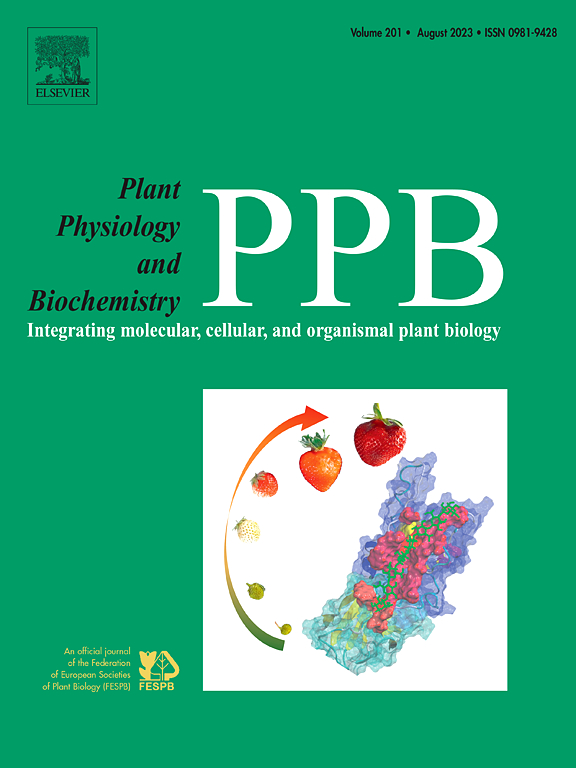甘薯中天然整合的rold样基因介导应激反应途径
IF 6.1
2区 生物学
Q1 PLANT SCIENCES
引用次数: 0
摘要
甘薯(Ipomoea batatas)是一种全球重要的主粮作物,主要由于其遗传多样性,对各种环境条件表现出卓越的适应性。最近的研究发现,在甘薯基因组中存在天然整合的农杆菌细胞t - dna (ct - dna),这表明它们可能在甘薯的进化和适应中发挥作用。在这项研究中,我们鉴定了一种新发现的开放阅读框(ORF),该框位于I. batatas的cT-DNA2区域,它编码a . rhizogenes rolD基因的同源物。该ORF编码一种具有鸟氨酸环脱氨酶(OCD)活性的rold样蛋白,OCD是脯氨酸生物合成的关键酶。功能分析证实重组的rolD样蛋白表现出鸟氨酸依赖的NAD+还原,类似于rolD基因的产物。值得注意的是,在茉莉酸甲酯处理下,以及在热、冷、盐、干旱、强光和紫外线辐射等非生物胁迫下,rolD-like基因的表达强烈上调。该基因在拟南芥中的过度表达导致开花延迟、苞叶缩短、种子产量减少,同时脯氨酸积累增加,表明其在胁迫响应机制中起作用。这些发现表明,这种类罗德基因的自然整合可能有助于红薯对非生物胁迫的抗性,为开发具有更强抗逆性的改良品种提供了潜力。本文章由计算机程序翻译,如有差异,请以英文原文为准。

A naturally integrated RolD-like gene in sweet potato mediates stress-responsive pathways
Sweet potato (Ipomoea batatas), a globally significant staple crop, exhibits remarkable adaptability to various environmental conditions, largely due to its genetic diversity. Recent studies have revealed the presence of naturally integrated Agrobacterium cellular T-DNAs (cT-DNAs) within the sweet potato genome, suggesting their possible role in the evolution and adaptation of sweet potato. In this study, we characterize a newly identified open reading frame (ORF) within the cT-DNA2 region of I. batatas, which encodes a homolog of the A. rhizogenes rolD gene. This ORF encodes a RolD-like protein with ornithine cyclodeaminase (OCD) activity, a key enzyme in proline biosynthesis. Functional assays confirmed that the recombinant RolD-like protein exhibits ornithine-dependent NAD+ reduction, similar to the product of the rolD gene. Notably, rolD-like gene expression was strongly up-regulated by methyl jasmonate treatment, as well as in response to abiotic stresses such as heat, cold, salt, drought, high light, and UV radiation. Overexpression of this rolD-like gene in Arabidopsis thaliana resulted in delayed flowering, shortened siliques, and reduced seed production, along with enhanced proline accumulation, indicating its role in stress response mechanisms. These findings suggest that the natural integration of this rolD-like gene may contribute to the sweet potato's resilience to abiotic stresses, offering potential for the development of improved cultivars with enhanced stress tolerance.
求助全文
通过发布文献求助,成功后即可免费获取论文全文。
去求助
来源期刊
CiteScore
11.10
自引率
3.10%
发文量
410
审稿时长
33 days
期刊介绍:
Plant Physiology and Biochemistry publishes original theoretical, experimental and technical contributions in the various fields of plant physiology (biochemistry, physiology, structure, genetics, plant-microbe interactions, etc.) at diverse levels of integration (molecular, subcellular, cellular, organ, whole plant, environmental). Opinions expressed in the journal are the sole responsibility of the authors and publication does not imply the editors'' agreement.
Manuscripts describing molecular-genetic and/or gene expression data that are not integrated with biochemical analysis and/or actual measurements of plant physiological processes are not suitable for PPB. Also "Omics" studies (transcriptomics, proteomics, metabolomics, etc.) reporting descriptive analysis without an element of functional validation assays, will not be considered. Similarly, applied agronomic or phytochemical studies that generate no new, fundamental insights in plant physiological and/or biochemical processes are not suitable for publication in PPB.
Plant Physiology and Biochemistry publishes several types of articles: Reviews, Papers and Short Papers. Articles for Reviews are either invited by the editor or proposed by the authors for the editor''s prior agreement. Reviews should not exceed 40 typewritten pages and Short Papers no more than approximately 8 typewritten pages. The fundamental character of Plant Physiology and Biochemistry remains that of a journal for original results.

 求助内容:
求助内容: 应助结果提醒方式:
应助结果提醒方式:


